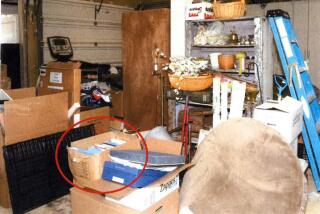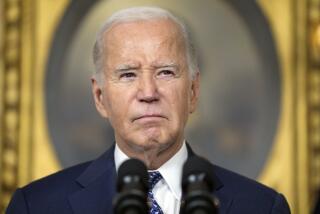Evidence in Padilla case detailed
- Share via
MIAMI — A key piece of evidence in the case against alleged terrorist operative Jose Padilla came from an Afghan man who told the CIA he found it in an Al Qaeda safe house, according to new court filings.
The man, unknown to the CIA at the time, drove up to the agency’s installation in Kandahar, Afghanistan, in a pickup containing “stacks of papers and other office materials” found in the house occupied by a group of Arabs, according to a CIA document newly filed in federal court.
It was common knowledge, the man said, “that the Arabs residing in this home/office, as with many other similar sites in the city of Kandahar, had been affiliated with Al Qaeda and Osama bin Laden,” according to the CIA description of the December 2001 meeting.
The Arabs had fled the house before the U.S. invasion of Afghanistan in October 2001, he said.
Among the Arabic documents was a blue binder containing dozens of forms that U.S. officials say were essentially applications for Al Qaeda terrorism training camps.
One of those forms was filled out and signed by Abu Abdullah al Mujahir, one of the aliases used by Padilla, federal prosecutors said.
Although the existence of the “mujahedeen data form” has long been public, how it wound up in U.S. hands has never previously been disclosed.
The document was filed last week, before the scheduled April 16 trial of Padilla and two codefendants on charges they were part of a North American support cell for Islamic extremist groups worldwide.
Padilla, a 36-year-old U.S. citizen, was held for 3 1/2 years as an “enemy combatant” once suspected of plotting to detonate a radioactive “dirty bomb” inside the United States. He was added in November 2005 to the Miami terrorism support case, which does not mention an Al Qaeda “dirty bomb” plot.
The form, which prosecutors say contains Padilla’s fingerprints, is the government’s single strongest piece of physical evidence. The CIA has asked that the officer who accepted it from the Afghan man be permitted to testify in disguise.
It is unclear if any other people whose names are on the forms will be called to testify.
Defense lawyers say they anticipate testimony authenticating the forms from Yahya Goba, one of the “Lackawanna Six” group of men in upstate New York convicted of terrorism support charges for attending camps in Afghanistan.
More to Read
Sign up for Essential California
The most important California stories and recommendations in your inbox every morning.
You may occasionally receive promotional content from the Los Angeles Times.










